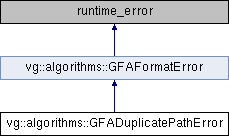#include <gfa_to_handle.hpp>
Inheritance diagram for vg::algorithms::GFADuplicatePathError:

Public Member Functions | |
| GFADuplicatePathError (const std::string &path_name) | |
| GFADuplicatePathError (const std::string &path_name, const GFAParser::cursor_t &position, const char *parsing_state=nullptr) | |
 Public Member Functions inherited from vg::algorithms::GFAFormatError Public Member Functions inherited from vg::algorithms::GFAFormatError | |
| GFAFormatError (const string &message) | |
| We can make one from a message. More... | |
| GFAFormatError (const string &message, const GFAParser::cursor_t &position, const char *parsing_state=nullptr) | |
| We can also make one with a position and a possibly null parsing state. More... | |
| virtual const char * | what () const noexcept |
Additional Inherited Members | |
 Public Attributes inherited from vg::algorithms::GFAFormatError Public Attributes inherited from vg::algorithms::GFAFormatError | |
| bool | has_position = false |
| GFAParser::cursor_t | position |
| size_t | pass_number = 0 |
| size_t | line_number = 0 |
| size_t | column_number = 0 |
| string | file_name = "" |
| string | message_buffer |
Detailed Description
This exception will be thrown if the GFA data includes multiple copies of what we take to be the same path. We need to be able to tolerate this situation at least in some cases because it is true of the HPRC first release graphs, which duplicate paths across P lines and rGFA tags.
Constructor & Destructor Documentation
◆ GFADuplicatePathError() [1/2]
| vg::algorithms::GFADuplicatePathError::GFADuplicatePathError | ( | const std::string & | path_name | ) |
◆ GFADuplicatePathError() [2/2]
| vg::algorithms::GFADuplicatePathError::GFADuplicatePathError | ( | const std::string & | path_name, |
| const GFAParser::cursor_t & | position, | ||
| const char * | parsing_state = nullptr |
||
| ) |
The documentation for this struct was generated from the following files:
- src/algorithms/gfa_to_handle.hpp
- src/algorithms/gfa_to_handle.cpp
 1.9.1
1.9.1